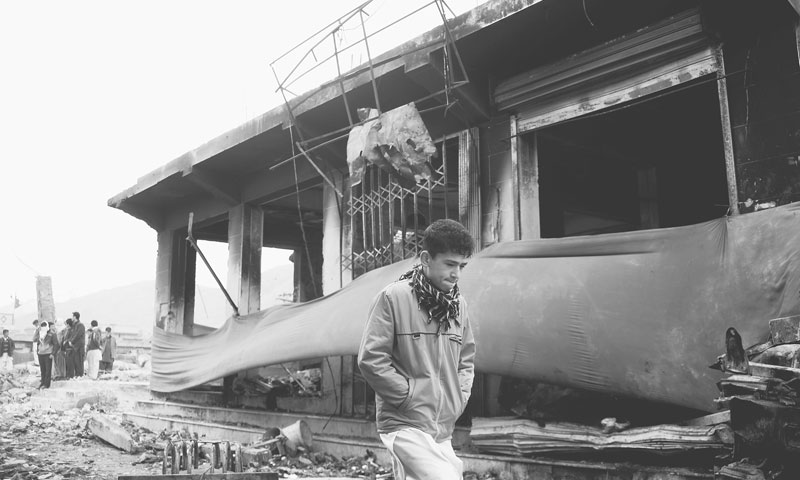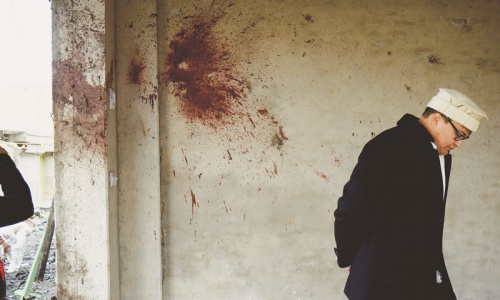The cries of victims of terror still echo through Alamdar Road
Every step is agony for Yousaf Ali, a victim of the Alamdar Road blasts of Jan 10, 2013, as he walks with the help of makeshift crutches. Both his legs were severely fractured when a suicide bomber rammed his explosive-laden vehicle into a snooker club on that fateful day, and he is still undergoing treatment.
But that agony is nothing compared to what he feels when he recalls the carnage he saw that day.
“Walking through this Chowk brings back painful memories,” says Ali. Having survived the first blast miraculously unscathed, he was busy shifting the injured to hospital when another bomber struck.
The bombing was followed by a three-day dharna, carried out by the Hazara community despite the bone-chilling cold. The protest prompted the PPP-led government to remove chief minister Nawab Raisani and impose Governor’s Rule in the province. Former prime minister Raja Pervez Ashraf himself reached Quetta and made the announcement.
Photos of the victims of these blasts are now displayed on the Alamdar Road Chowk. Previously there was plenty of hustle and bustle on the Chowk, which links Nichari Road with Alamdar Road but it is now desolate. The residents now call it “Chowk-i-Shaheedan.
Those who lost their loved ones have a hard time passing the Chowk. “I cannot forget my friend who lost his life in the bombing,” Ali says sadly. He is one of the around hundred injured victims who try every day to bury the grief and sorrow that refuses to fade away.
Such was the intensity of the explosion that dozens of shops and houses located on Alamdar Road Chowk were completely destroyed. The ruins stand today as a grim reminder of the devastation wrought here in a single night, of a whole street reduced to the abode of unquiet spirits. The shopkeepers and residents still seem to be frightened of coming back to their shops, which along with the business centre, used to remain open till midnight. Now they pull down their shutters soon after sunset. “It is too risky to open our shops after sunset,” says Shabir Ali, a shopkeeper who lost his elder brother in the blast while another sustained serious wounds.
“I cannot forget that day when my brother died in the blast,” he says with tears in his eyes. “That was doomsday for us when we carried his coffin on our shoulders,” he says.
There are countless people like Shabir here, countless families who have been torn asunder.
A government school teacher by profession, Naseer Ahmed now runs his elder brother’s general store at the Alamdar Road Chowk in the evenings. Ahmed’s elder Noor Ahmed was also killed in the blast and financial circumstances forced Ahmed to keep his dead brother’s shop open as his meagre salary cannot cater to the family’s needs. “My nieces ask me everyday about their father’s return. They think he has gone away for business.” Everyday, he has to invent a new story to tell them.
Like Ali, who now walks on crippled legs, Noor Ahmed was also engaged in rescue work when the second attack took place. Police said the suicide bomber used an ambulance in the second attack, pretending to be one of the rescue workers he targeted.
Such was the strength of the blast that the victims’ faces were unrecognisable, and grief-stricken families searched for days and nights to identify their loved ones. “After two days of searching I recognised my brother’s body at the Combined Military Hospital,” Ahmed said as he burst into tears.
Three journalists including Saif ur Rehman, a reporter of Samaa TV, Imran Sheikh cameraman Samaa TV and Muhammad Iqbal, a photographer from NNI were also killed in the second bombing. They were covering the first blast when the suicide bomber struck.
Similarly, four rescue workers of Edhi Foundation were killed and six injured in the same attack. This year, the local journalists’ community and rescue workers also marked the first death anniversary of the victims and paid a tribute to them.
In the evening, mothers and sisters frequently visit the site of the explosion and offer fateha for the departed souls. Everyday the site of explosion reminds them of their loved ones. A memorial has been established on the site for blast victims. “Every evening, a large number of women gather here to offer fateha,” Naseer Ahmed said.
All roads leading to Alamdar Road and Marriabad are strictly manned by the FC and every individual and vehicle entering the area is thoroughly checked by FC. But despite this, and despite a year having passed since the attacks, a sense of insecurity still prevails among the people. Memories of the victims continue to haunt the broken and shattered families of Alamdar Road. They remain haunted by horror.














































